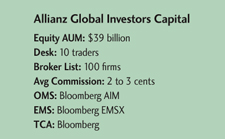Kevin Chapman, head of trading at San Diego-based Allianz Global Investors, relishes the tough trades.
“I love getting a very illiquid order and being able to find the other side of trade at a low cost, relative to the expected cost,” he said. “It always makes the PM and me happy-not to mention, it helps us preserve alpha for our clients.” Trading is about beating the clock, Chapman added.

“I want to get that order, see it and then be able to get it done in five minutes, versus five days.”
It’s the challenge of finding that elusive stock and in size needed within a time frame. That has been Chapman’s raison d’etre throughout his career.
It’s that race against time and adverse price movement that have motivated him since his University of Wisconsin at Milwaukee days. There, he interned at Strong Investments in operations first and then saw the trading floor. Immediately, he was smitten by the electricity in the air surrounding the desk. He hasn’t been the same since.
“I saw a lot within Strong Investments, but I knew I didn’t want to be an analyst,” he said. “Then I saw the trading desk, and it looked like a fun place to be. They were really enjoying the markets.”
That was in 1993, when the business of trading was simpler. But that passion still remains, despite the changing market structure and challenges in getting his orders filled fast.
How does one fill orders pronto?

He looks everywhere and uses various approaches. He has no permanent loyalty to any one broker or venue.
So Chapman might use an algorithm, dark pool or high-touch desk at one of his myriad brokers. Sometimes he even works the order himself via instant messaging. Every strategy requires a fresh approach, he added, necessitating a vast broker network.
He has 100 or so brokers on his list, and some 80 percent of his trades are done with the top 10 firms. Still, some stocks are so illiquid a trade might require using a mid-tier or boutique broker further down the list.
“My philosophy is: We don’t want to miss out on volume because we don’t have a relationship with someone,” Chapman said. “We don’t want to close any doors to find the contra in a trade that will reduce market impact.”
For Chapman, getting the fill means keeping all options open, from venue choice to trading strategies, and jettisoning those that don’t work.
“Are we missing out on volume? Why is that happening?” Chapman asks when a trade is unfinished. “I ask myself why are we not getting it and how do we get it?”
Chapman is always adapting trading strategies. He examines new venues such as Aqua, where he is looking to source block liquidity in mid- and small caps. Also on his radar is AX Trading Network and its call-auction system. He wants to see if it can help him find illiquid domestic and international names. He uses Liquidnet for his block needs now.
“As the market evolves, we’ll always look at new tools,” he said. “I’ll get rid of some and pick up new ones. It’s all about best execution.”



